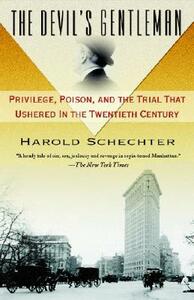Take a photo of a barcode or cover
38 reviews for:
The Devil's Gentleman: Privilege, Poison, and the Trial That Ushered in the Twentieth Century
Harold Schechter
38 reviews for:
The Devil's Gentleman: Privilege, Poison, and the Trial That Ushered in the Twentieth Century
Harold Schechter
This is quite a lengthy book, which is eminently appropriate since the case related within at the time set a record for the longest trial in American history. From the date of the murders which set things in motion to the final result, it dragged on for over four years, through a coroner's hearing, an incredibly long and expensive trial, appeals, another trial. It makes the book somewhat hard-going, as the endless legal wrangling is somewhat tedious, but since it's in keeping with the events related within it doesn't spoil the book.
Taking place in the final years of the nineteenth century, this is a fascinating look at the privileged life of the wealthy in Gilded Age New York, although not the top 400 of the Astors and Vanderbilts. Roland Molineux was a wealthy son of a revered Civil War general, a renowned athlete and member of an exclusive athletics club - and after the death of one member and the attempted poisoning of the club director, suspicious fell on Roland as the poisoner.
The final result of the case is somewhat murky - I won't say more for fear of spoiling the read - but reading this book you're left in little doubt as to where the author believes the guilt lies. I'm inclined to agree with him, although of course how much he intends his audience to think that way, given the way the evidence is presented, is a matter for speculation. Either way, it makes for an engrossing read.
Taking place in the final years of the nineteenth century, this is a fascinating look at the privileged life of the wealthy in Gilded Age New York, although not the top 400 of the Astors and Vanderbilts. Roland Molineux was a wealthy son of a revered Civil War general, a renowned athlete and member of an exclusive athletics club - and after the death of one member and the attempted poisoning of the club director, suspicious fell on Roland as the poisoner.
The final result of the case is somewhat murky - I won't say more for fear of spoiling the read - but reading this book you're left in little doubt as to where the author believes the guilt lies. I'm inclined to agree with him, although of course how much he intends his audience to think that way, given the way the evidence is presented, is a matter for speculation. Either way, it makes for an engrossing read.
A well-written account of what feels like the same old story. A wealthy man murders, it is written about exhaustively by the press (especially tabloids) and he eventually is found not guilty. The outcome of this story is depressingly familiar but in no way detracts from the book itself
While, Schechter has a talent for writing and trying to keep the reader interested, the story just got too bogged down in detials. Schechter wrote about people in the trial and the life of Roland that just did not matter. Which bogged down the book and just didn't move. Interesting stuff though!
Several things:
1. I was really not amused by the constant nudge-nudge suggestions that Roland Molineux might have been (stage whisper) gay. For one thing, there's no proof, and for another, who cares? Unless of course the writer is insinuating that Roland committed the crime BECAUSE he was (maybe, possibly, if you turn your head and squint) queer, which I'm sure Schecter would never do. Because that's terrible.
2. I also wasn't amused by the constant heavy-handed slaps at Blanche for being "frivolous" and "a golddigger" and not loving her husband. Blanche's only crime here was dating more than one guy and wanting to be rich and famous- which is not really a crime at all, especially compared with the actual crime of murdering two people and trying to murder a third.
3. Where exactly does Schecter get off hand-wringing about how awful tabloids and true crime books are given that he's basically made a career of WRITING true crime books with titles like "DERANGED: THE SHOCKING TRUE STORY OF AMERICA'S MOST FIENDISH KILLER!" Glass houses, dude.
1. I was really not amused by the constant nudge-nudge suggestions that Roland Molineux might have been (stage whisper) gay. For one thing, there's no proof, and for another, who cares? Unless of course the writer is insinuating that Roland committed the crime BECAUSE he was (maybe, possibly, if you turn your head and squint) queer, which I'm sure Schecter would never do. Because that's terrible.
2. I also wasn't amused by the constant heavy-handed slaps at Blanche for being "frivolous" and "a golddigger" and not loving her husband. Blanche's only crime here was dating more than one guy and wanting to be rich and famous- which is not really a crime at all, especially compared with the actual crime of murdering two people and trying to murder a third.
3. Where exactly does Schecter get off hand-wringing about how awful tabloids and true crime books are given that he's basically made a career of WRITING true crime books with titles like "DERANGED: THE SHOCKING TRUE STORY OF AMERICA'S MOST FIENDISH KILLER!" Glass houses, dude.
This case was mentioned in The Poisoner's Handbook and I thought I knew what was going to happen (and to some extent I was right) but there were some things that were a surprise to me.
This is quite a lengthy book, which is eminently appropriate since the case related within at the time set a record for the longest trial in American history. From the date of the murders which set things in motion to the final result, it dragged on for over four years, through a coroner's hearing, an incredibly long and expensive trial, appeals, another trial. It makes the book somewhat hard-going, as the endless legal wrangling is somewhat tedious, but since it's in keeping with the events related within it doesn't spoil the book.
Taking place in the final years of the nineteenth century, this is a fascinating look at the privileged life of the wealthy in Gilded Age New York, although not the top 400 of the Astors and Vanderbilts. Roland Molineux was a wealthy son of a revered Civil War general, a renowned athlete and member of an exclusive athletics club - and after the death of one member and the attempted poisoning of the club director, suspicious fell on Roland as the poisoner.
The final result of the case is somewhat murky - I won't say more for fear of spoiling the read - but reading this book you're left in little doubt as to where the author believes the guilt lies. I'm inclined to agree with him, although of course how much he intends his audience to think that way, given the way the evidence is presented, is a matter for speculation. Either way, it makes for an engrossing read.
Taking place in the final years of the nineteenth century, this is a fascinating look at the privileged life of the wealthy in Gilded Age New York, although not the top 400 of the Astors and Vanderbilts. Roland Molineux was a wealthy son of a revered Civil War general, a renowned athlete and member of an exclusive athletics club - and after the death of one member and the attempted poisoning of the club director, suspicious fell on Roland as the poisoner.
The final result of the case is somewhat murky - I won't say more for fear of spoiling the read - but reading this book you're left in little doubt as to where the author believes the guilt lies. I'm inclined to agree with him, although of course how much he intends his audience to think that way, given the way the evidence is presented, is a matter for speculation. Either way, it makes for an engrossing read.
This was an extremely interesting story. I thought that the author had a tendency wander off topic without adding to the story. I liked that the author let the facts speak for themselves, but it felt a bit like a report instead of a book. It's interesting just how much the past seems to repeat it's self in the case of high profile court cases. It also seems relevant in today's age how much money can still buy your freedom. It surprised me that it felt like the science was missing from the poison aspect. When I thought about this book a little more I realized I felt glad when it was finished with it.




